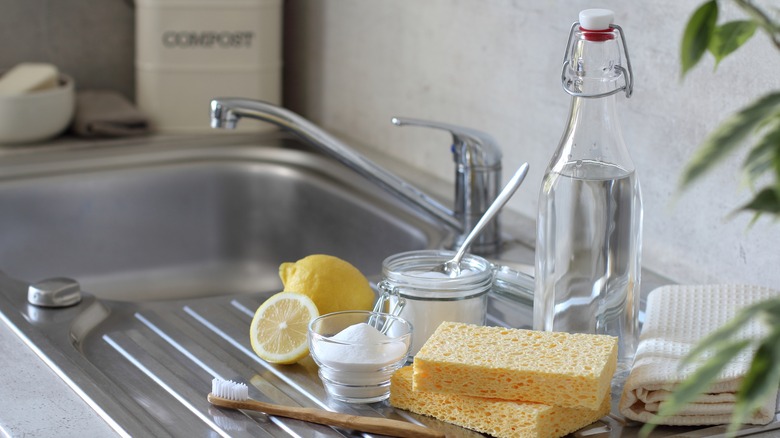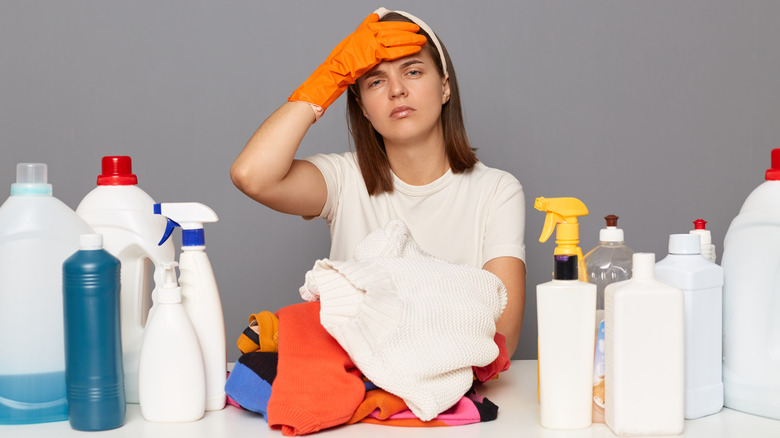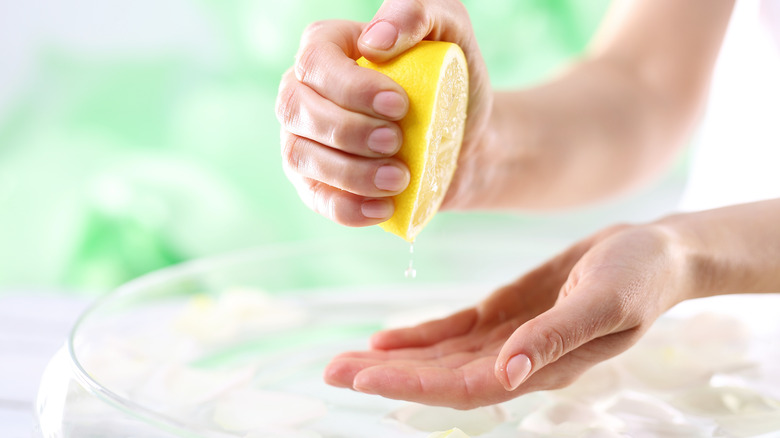Mixing This Natural Cleaning Ingredient With Bleach Is A Dangerous Mistake
We live for all-natural, eco-friendly cleaning hacks. Using baking soda to remove carpet stains, adding a dash of vinegar to your laundry — you name it, we're all over it. One of the finest go-to natural cleaning products actually comes from the fruit bowl: good old-fashioned lemons. While the whole lemon offers fantastic cleaning power, lemon juice is particularly popular as a cleaning ingredient, as the high acidity of the juice makes it perfect for cutting through greasy buildup and debris.
So, with all that natural cleaning power and no artificial chemicals, you may think it's safe to add a bit of lemon juice to just about any cleaning solution to amp up the cleaning factor or leave that fresh, lemony scent. Some might even be tempted to mix some lemon juice with bleach to maximize its cleaning abilities without the pungent scent. But this would be a huge mistake. This might surprise you, as we often think of natural cleaners as neutral and safe, but when mixed with bleach, lemon juice forms toxic chlorine gas.
Why you shouldn't mix lemons and bleach
The resulting chemical reaction of mixing lemon juice and bleach is the same as mixing vinegar or any other acidic ingredient with bleach. According to the CDC, the acidic compounds of the lemon juice and alkaline compounds in the bleach create both chlorine gas and water. The gas and water continue to react, creating hydrochloric and hypochlorous acids, which can cause nausea, shortness of breath, vomiting, headache, and chest pain even in low levels at acute exposure. As per the National Library of Medicine, many chlorine gas exposures are caused by household cross-contamination. These incidents occurred roughly 2,284 times in US households in 2017 (via Toxicology Education Foundation) as a direct result of mixing acid with bleach, so the importance of never combining lemon juice with bleach really can't be overstated.
In addition to lemon juice and vinegar, other acidic combinations you shouldn't mix with bleach include acetic, citric, and gluconic acids, as well as sodium bisulfate. Keep in mind this is not a complete list, and you should research each active ingredient in your cleaning supplies before mixing them with anything, let alone bleach.
What can I use instead?
Wondering if there's anything you can mix with bleach safely? The general consensus is that mixing bleach with any other cleaner, whether alkaline (such as ammonia), neutral, or acidic, should be avoided as the risk of a chemical reaction is too great. Some articles say mixing powdered detergent with bleach is okay, as this is often the combination inside your washing machine. In fact, viral cleaning company GoCleanCo uses this combo in its all-purpose cleaning solution but advises never to mix anything else with bleach.
Instead of finding ways to boost your bleach with other cleaning products, consider using bleach only as a disinfectant after the hard work of cleaning, rinsing, and drying is done. Bleach is known for its stain-removal properties, but hydrogen peroxide, vinegar, and, yes, lemon juice are handy alternatives to bleach, so there's no real need to use it during the cleaning process. Instead, just use it to disinfect surfaces, then be sure to rinse and dry again to prevent any unnecessary exposure or possible cross-contamination.



